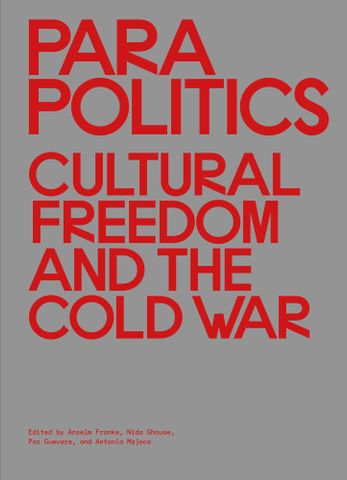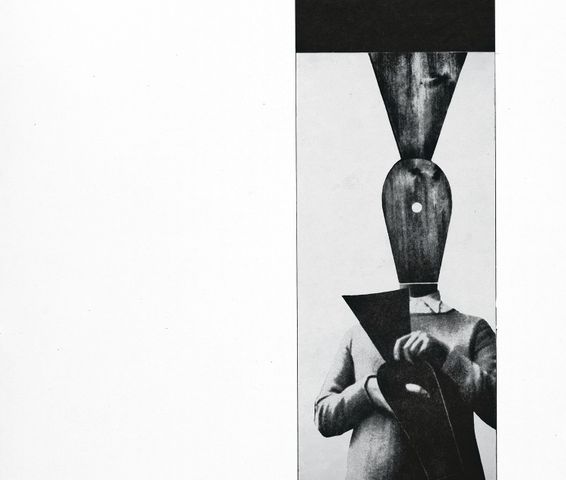Parapolitics
Cultural Freedom and the Cold War

Edited by Anselm Franke, Nida Ghouse, Paz Guevara and Antonia Majaca
Sternberg Press, 2021
616 pages, hardcover
In English
Price: € 34
Available at bookstores, mail order buying / postal shopping via the Webshop
During the Cold War, modernist art became a flagship of freedom and democracy in the West, and took on the role of a symbolic overcoming of fascism. Parapolitics: Cultural Freedom and the Cold War examines the cultural diplomacy of this period, particularly the activities and magazines of the Congress for Cultural Freedom, an organization funded by the Central Intelligence Agency that was tasked with steering the left away from Soviet Communism and toward a new world order established under the aegis of the United States. This book analyzes how the organization’s activities in the non-European world were a major force behind the culturalization of economic liberalism on an international scale. With extensive archival documentation and recent responses by artists and writers, this book is a rich reference for readers interested in challenging the structural conditions of contemporary art and the prevailing canons of modernism.
Contributors include Lene Berg, Kodwo Eshun, Barnor Hesse, Hyunjin Kim, Sylvester Ogbechie, Rasha Salti, Erhard Schüttpelz and many others.
Table of contents:
Foreword
Bernd Scherer
Introduction
Anselm Franke, Nida Ghouse, Paz Guevara, Antonia Majaca
A Chronological List of the Activities of the CCF and IACF
A World Frozen in Art
Anselm Franke
Gentlemen & Arseholes
Lene Berg
Charged Objects of Former Reverence
Nida Ghouse
Abstraction
Iman Issa
Two Concepts of White Sovereignty
Barnor Hesse
Round Heaven, Square Earth
Michael Baers
Edward Shils, “The End of Ideology?,” Encounter, vol. 4, no. 2 (1955), pp. 52–58
Odysseus of the Nimble Wits: The Spirits of Totalitarianism and the Cultural Cold War’s Entscheidungsproblem
Antonia Majaca
M. R. Masani, “The Milan Conference – A Report,” Freedom First, no. 42 (November 1955), pp. 5–7
Der Monat
Michael Hochgeschwender
Quest
Chinmay Sharma
J. S. Saxena, “The Coffee-Brown Boy Looks at the Black Boy,” Quest, no. 65 (April/June 1970), pp. 60–67
Sasangge and the Paradox of the Freedom Discourse in the Korean Peninsula
Hyunjin Kim
Neutrality, a Battlefield of Minds: The Congress for Cultural Freedom in Scandinavia
Rhea Dall
Dwight Macdonald, “America! America!,” Dissent (1958), pp. 313–23
The Power of Interpretation: How MoMA Explained Guernica to Its Audience
Andrea Giunta
Much Ado about a Drawing
Lene Berg
The (Re)Invention of Postwar Modernism
Porter McCray
Yugoslav Fanonism and a Failed Exit from the (Cultural) Cold War
Ivana Bago
Exhibition as Medium for Geopolitical Operations: Digging Up the Exhibitions of the Congress for Cultural Freedom
Paz Guevara
Four Saints in Three Acts—A Case Study
Jenifer Evans
The Living Arts of Ancient TV: India and the Idiot Box, 1955
Alexander Keefe
FSMR: New Temples of New Sound
Yashas Shetty
Clement Greenberg in India: A Recursive History
Karin Zitzewitz
The Man in the Background
Lene Berg
The Symbolic Form of the File: An Intense Undercover Activity Intended to Change the Course of History
Voluspa Jarpa
Neoliberal Economics and the Double Disfigurement of the Third World
Quinn Slobodian
THE SOUND OF THE CLOSING DOOR
Erhard Schüttpelz talks to Nida Ghouse
Purity of Art and the Racial Politics of Modernism
Christian Kravagna
Parallel Lines and Crosshatchings: The Souza-esque Art of Delineating Duplicity
Savita Apte
The Story of Hiwar:
Cold War Imbroglio and the Struggle for Autonomy
Rasha Salti
The Transitional Coalition: Reciprocal Readings of Transition and the Congress for Cultural Freedom between 1962 and 1967
Kodwo Eshun
A Refusal to Be Transcribed: “Africa will be free before we have even managed to get ourselves a lousy cup of coffee.”
Stacy Hardy
Wole Soyinka, “Telephone Conversation,” The New African, August 1962, p. 10
Letter to the Editor: How to Address the Scope of Liberal Positions with and within the South African Magazines?
Annett Busch
Ayi Kwei Armah, “Contact,” The New African, vol. 4, no. 10 (1965), pp. 244–48
Untogether Together: Bessie Head’s Writing in The New African
Gabi Ngcobo
What Would Tutuola Do?
Emmanuel Iduma
Ulli Beier, Cultural Brokerage, and Cold War Parapolitics
Sylvester Okwunodu Ogbechie
Ezekiel Mphahlele, “Mbari—First Anniversary,” The New African, vol. 1, no. 8 (1962), p. 7
Ulli Beier, “Ibrahim Salahi,” Black Orpheus, no. 10 (n. d.), pp. 48–50
Signifying Deceit:
Richard Wright’s Anti-Colonial-Anti- Capitalist-Anti-Communism
Kodwo Eshun
James Baldwin, “Princes and Powers,” Encounter, vol. 8, no. 1 (1957), pp. 52–60
